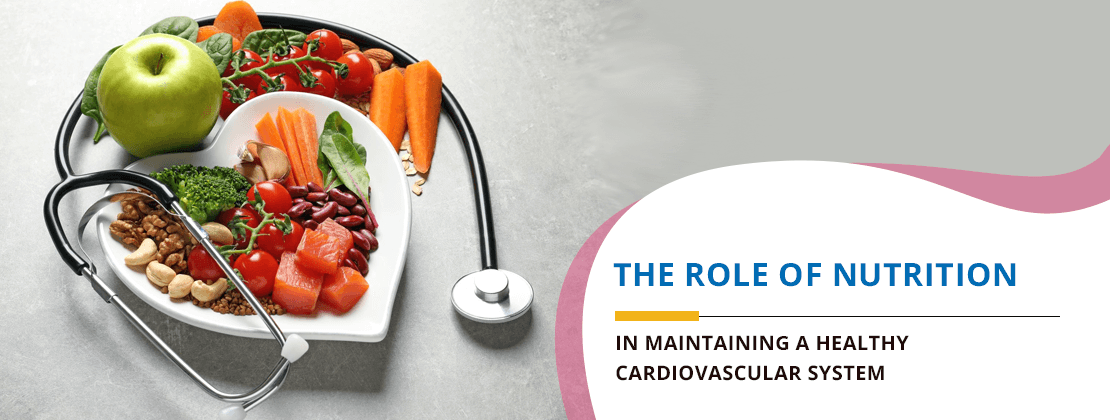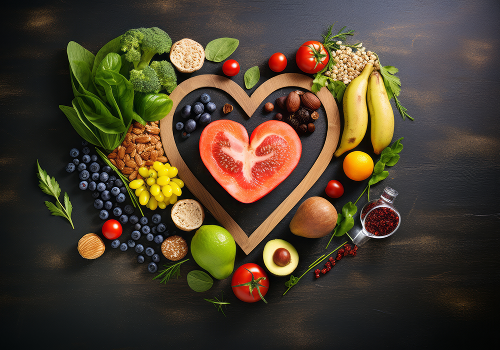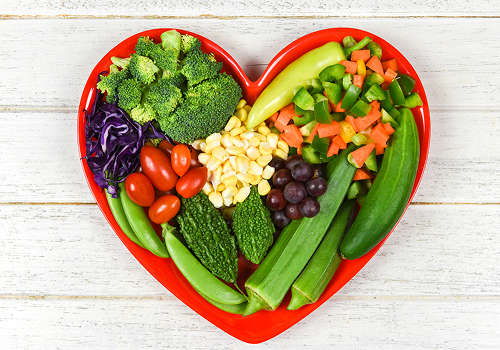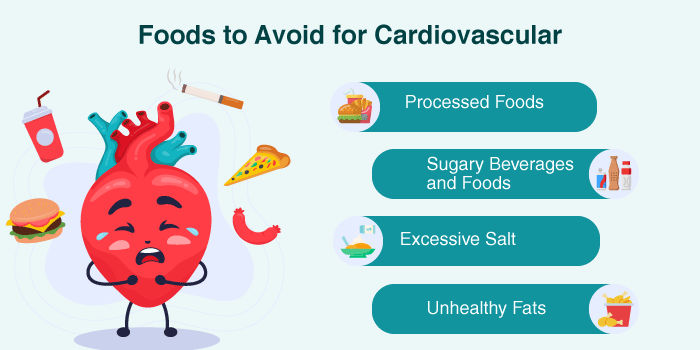
Home / Blog / The Role of Nutrition in Maintaining a Healthy Cardiovascular System
A healthy heart is the foundation of overall well-being, and nutrition plays a vital role in maintaining cardiovascular health.
Eating a balanced diet for heart health can decrease the chances of getting sick from heart problems and improve overall well-being.
Understanding which foods are good for heart health and which to avoid can significantly impact one’s heart function and longevity.
For the heart to work properly, it needs certain essential nutrients.
Eating well can help manage high blood pressure, elevated cholesterol levels, and inflammation, which increase the risk of various heart diseases. Individuals who consume heart-healthy foods typically enjoy a well-functioning heart and a reduced risk of developing life-threatening heart conditions.

1. Omega-3 Fatty Acids
Omega-3 fatty acids are present in oily fish such as salmon and nuts like walnuts and flaxseeds. These fats can lower the chances of getting a heart attack by reducing inflammation.
Consuming omega-3 fatty acids can help one lower their triglyceride levels and ensure that the arteries are in good condition.
2. Fibre
Fibre is found in whole grains, legumes, fruits, and vegetables. It aids in the reduction of cholesterol levels as well as controlling the level of sugar in the blood. More specifically, soluble fibre combines with cholesterol particles and removes them from the bloodstream.
3. Antioxidants
Berries, nuts, and dark chocolate contain antioxidants that lower oxidative stress and protect cardiac myocytes. They also promote good endothelial health and blood flow.
4. Potassium
Potassium is found in bananas, potatoes, and vegetables, and it helps control salt levels and blood pressure. Hypertension risk can be lowered by consuming low-potassium foods.
5. Magnesium
Nuts, seeds, and whole grains are rich in magnesium, which is necessary for the proper functioning of the heart and muscles. Not having enough magnesium in one’s diet may cause a person to develop high blood pressure or arrhythmia.
6. Healthy Fats
Avocados, olive oil, and nuts provide monounsaturated and polyunsaturated fats, which help reduce bad cholesterol (LDL) while increasing good cholesterol (HDL).
Additional Reading: How to Prevent Heart Disease: Tips for a Stronger, Healthier Heart – HCG Hospitals

Several dietary patterns have been recognised for their positive impact on heart health. These diets emphasise heart-healthy foods and minimise processed and unhealthy options.
1. Mediterranean Diet
Rich in olive oil, whole grains, fish, fruits, and vegetables, the Mediterranean diet is associated with a lower risk of heart disease. It promotes healthy fats and lean protein sources, making it a top diet for heart health.
2. DASH Diet (Dietary Approaches to Stop Hypertension)
This diet aims at cutting down on salt consumption and increasing the intake of some specific minerals and fibrous foods. The diet insists on taking complex carbohydrates, low-fat proteins, and enough fruits and vegetables.
3. Plant-Based Diets
Vegan and vegetarian diets emphasise plant-derived foods, eliminating or minimising animal products. They are associated with decreased cholesterol levels as well as a lower chance of getting heart attacks.

While incorporating foods for heart health is essential, avoiding harmful foods is equally important.
1. Processed Foods
Unhealthy trans fats and too much salt are found in packaged snacks, fast food, and processed meats, which cause hypertension and heighten the chances of a heart attack.
2. Sugary Beverages and Foods
Eating too much sugar can lead to obesity and cause diabetes and inflammation, which are both dangerous because they can lead to heart attacks. Avoiding sodas, candies, and sugary cereals is crucial.
3. Excessive Salt
Eating too much salt causes high blood pressure, which in turn increases the chances of having a stroke or suffering from heart attacks. Reducing processed and restaurant-prepared foods can help maintain a healthy heart.
4. Unhealthy Fats
The unhealthy fats contained in fried foods, margarine, and some pastries cause blocked blood vessels and high blood cholesterol.
Hydration
Drinking adequate water supports proper circulation and reduces the risk of blood clot formation. Dehydration can strain the heart and lead to increased heart rate and blood pressure.
Portion Control
Overeating, even of healthy foods, can contribute to obesity and metabolic disorders. Portion control ensures balanced calorie intake, preventing excess weight gain and heart strain.
Neglecting proper nutrition can have severe consequences. A diet high in processed foods, unhealthy fats, and excess sugar can lead to conditions such as:
A well-balanced diet for heart health plays a crucial role in maintaining cardiovascular well-being. Incorporating heart-healthy foods, avoiding harmful dietary choices, and practicing proper hydration and portion control can significantly lower the risk of heart disease.
Getting advice from a cardiologist or going to a well-known cardiology hospital in India may give you a special diet plan and modern treatment for heart problems. By making informed dietary choices, individuals can take proactive steps toward a healthier heart and a longer, more fulfilling life.